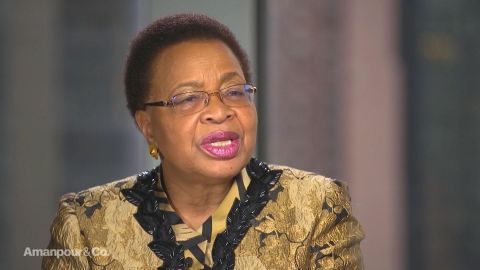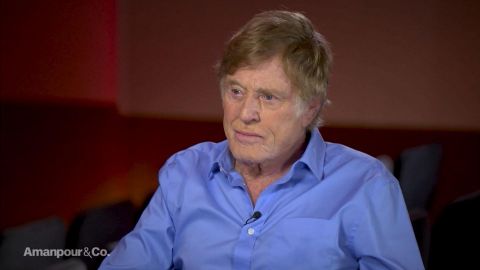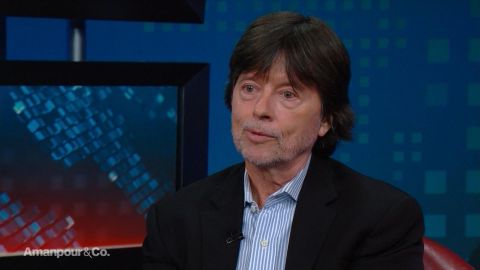Read Transcript EXPAND
WALTER ISAACSON: Why the Mayo Clinic?
KEN BURNS, EXECUTIVE PRODUCER, “THE MAYO CLINIC”: Well, I think we’ve always looked over the course of 40 years at stuff that are uniquely American. I think that each of the films hold up a mirror to us of who we were and tell us a lot of about who we are now. So I was drawn in, sucked into the Mayo formula and the history, the ark of the history and I knew it had to be sort of counterbalanced with contemporary stories. And if I hadn’t done Vietnam, I don’t think I would have been able to manage this as well.
BURNS: So the arch of the Mayo Clinic is a history, but within it there are moments that suggest an ability to jump ahead to the present and look at things. And so, we just concentrated for several years on this project and then when we finished it and stood back and looked at it, we realized that we had something that was talking about the current healthcare crisis, without having to get down into the marass of the superficiality of the politics of it. That here was a great model of something that worked and rather than get into the he said, she said kind of stuff, that the kind of simple dialectics of politics, you could look at it and say, well here’s a recipe of something that works.
ISAACSON: And let me show a clip from the new Mayo Clinic documentary. It’s really about values and personality.
BURNS: Yes.
UNKNOWN FEMALE: Melanoma is actually one of the most common cancers that can spread even to the fetus. We reviewed what she wanted to do and she was very clear that she did not want to proceed with elective termination.
UNKNOWN MALE: For her we used a plaque (ph), it looks like a bottle cap and you put radio active seeds within it and then you sew this on the eye so the goal doesn’t allow the radiation to come anywhere else but into the eye. Sometimes I deal with people that die. I feel that the only way that I can give hope is if I know in my heart of hearts I’m trying to push the boundaries.
ISAACSON: What did you learn from doing the Mayo Clinic that affects how we should think about healthcare today?
BURNS: Well, I think they’ve got the secret and it’s not a secret. They’ve been practicing it for more than century and being the best hospital in the United States and I would therefore infer the world, we ought to stop and look and see what’s right. Now, this doctor is an eye doctor, a cancer specialist and he’s recommending termination because he’s concerned about it. But, because Mayo puts the patient first, they could learn that she wasn’t interest in terminating the pregnancy. Take my eye, she says, in an earlier moment. And he admits, I know about the eye, not so much about the tummy or the babies being born. And yet we do know that the presence of this cancer can move to the fetus, and yet, the collaborative nature of Mayo, I mean, they’re non-profit, the trend is toward profit making and so the put the patient first and that seems sort of logical, but in point of fact, it’s often the doctor who’s first or the hotel — or the hospital administrator who’s first or the insurance guy who’s first. And they put the patient first, what do they need. And because these doctors are on salary, no unnecessary tests, no unnecessary procedures, there’s a collaborative nature. It self-selects for a certain type of person. You can see the commitment of Dr. Pulido who agonizes over each lost patient that he wishes to reach out to a specialist who can help and make it better and they do.
ISAACSON: You do that in the Vietnam film so well. You take it down to the level of the people, the personalities and real people on the ground, not just the leaders. One of them, that’s just a wonderful theme is John McCain.
BURNS: Yes.
ISAACSON: And you became close to John McCain, we’ve just lost him. How do you feel his values are being dishonored in this day and age?
BURNS: For all of his service to the country, I think he’s going to do his greatest service in death. He is going to be the person who reminds us of where we have been and where we could be. And in that space is the possibility for us to literally transcend the current miasma that we’re in. That’s what I’m interested in, in the United States of America. Those are the stories I want to tell. Whether it’s the Mayo Clinic, which could not have happened without this amazing story and it’s this intersection of, obviously, great, great science, but it’s also about faith and about hope and the things that the sisters of St. Francis in Rochester, Minnesota, brought to the equation. If you took them away, the Mayo Clinic would not be the Mayo Clinic and that’s an interesting story, particularly for American’s who prefer for lots of different reasons not to deal with spiritual aspects of our history or religious aspects of our history. Let’s just say, American history is only a sequence of presidential administrations punctuated by wars. And when we do those wars, we also want to make sure we understand what’s happening on the home front.
BURNS: What the ordinary soldiers is feeling as well as the general and the president who might be commanding that war. And that’s been our assignment, you know, for the last 40 years.
ISAACSON: And what’s what you did in sort of the big signature — early signature thing, which was the Civil War documentary. But history in some ways shifts and changes.
BURNS: Yes, it does.
ISAACSON: When you look at the Civil War, is there ways you look at that was differently, you look at what Shelby Foote talked about differently, you look at the monuments issue and whether we should be taking down Robert E. Lee differently?
BURNS: I think first of all, it’s about freedom. And this is what we articulated. And it’s a wonderful, complex freedom because there’s two kinds. There’s a kind of collective freedom, what we need, and there’s an individual freedom, what I want and they’re often at odds with one another. But once you acknowledge that we’re all about trying to parse that, then race is the next big thing. Because the guy who articulated our creed, Thomas Jefferson, wrote in the second sentence of the declaration, we hold these truths to be self evident that all men are created equal. So I’m a third of the way through the sentence; he owned 200 human beings when he wrote that. He never saw the contradiction, never saw the hypocrisy and more important, never saw fit in his lifetime to free any one of them. And I think helped symbolically, if not literally, set in motion an American narrative which would be struggling with race throughout its existence.
ISAACSON: As you know well, we in New Orleans led by Mitch Landrieu took down the statue of Robert E. Lee.
BURNS: Yes.
ISAACSON: Was that right?
BURNS: Yes, absolutely right. And I can tell you in the simplest of ways. You need a litmus test? There’s been worries and people saying oh, what are we going to do, get rid of George Washington and Thomas Jefferson (inaudible)? No, we’re not. This is part of our complication. But these monuments were added in two periods. One is at the beginning of the reimposition of white rule and the advent of the Ku Klux Klan, who took and borrowed only one battle flag. Not the battle flag — not the — not the flag of the confederacy, but the battle flag of the army of Northern Virginia. And just one of them. And that became their symbol. When the Dixie flag worked its way into the state flags, with the exception of Mississippi, which came in in this period of the late 1880s and `90s, they all came in after 1954. And the only thing that happened in 1954 that this poor soul remembers is Brown versus Board of Education. So if you have something in which you’re taking a symbol of this home grown American terrorist organization, the Al Qaeda of America, the ISIS of America, the Ku Klux Clan and you’re borrowing their symbolism or you’re borrowing their heroes that they, themselves, were insisting be put up at a time, then don’t I don’t think we have an argument here. You know, the United States calls the Civil War the war of the rebellion. Lincoln never said confederacy, he called them rebels. And they lost. But people always say that the victors write — ISAACSON: In history we’ve all made mistakes. And you know what, 100 years from now they’re going to think we made some really whopper mistakes–
BURNS: And we have.
ISAACSON: How does what you’ve done give you sort of a sense of meaning and a sense of values that makes you so optimistic about the future of this country?
BURNS: Well, so there’s a couple of things. One is, you know, meaning of cruise and duration, the work you’re proudest of, the relationships you care the most about have benefitted from your sustained attention. So there’s nothing wrong with being wrong in a period of supposedly short attention spans. And when you end up aggregating 50 million people for the first showings of — of Vietnam, that tells you that there’s that hunger out there. The other thing is is that the world, you, measure us by what we complete. It’s about practice. It about process. It’s not about presentation. You know, someone asked Duke Ellington what his — his most important composition was. And, you know, this is arguably, I would say, the greatest composer in American history, was certainly the most prolific composer, 2,500 compositions. And he said the one I’m working on now. And that’s exactly right. I think if we are identified with the finished product, we miss the point of why we go to work, which is work in and of itself is a liberation and that process of trying to take a story and make it better just continues in the next. So in many ways, I think all I’m saying — and I hope I’m not, you know, jinxing everything, is that we’ve made the same film over and over again. And each film asks deceptively one simple question. Who are we? Who are those strange and complicated people that like to call themselves Americans and what does an investigation of the past tell us about not only where we’ve been, our past, but where we are right now, our present. And most importantly, Walter, where we’re going, our future.
ISAACSON: Ken Burns, thank you for being with us, sir.
BURNS: Thank you.
About This Episode EXPAND
Christiane Amanpour interviews Graça Machel, Nelson Mandela’s widow; and actor Robert Redford. Walter Isaacson interviews Ken Burns Executive Producer of “The Mayo Clinic.”
LEARN MORE


